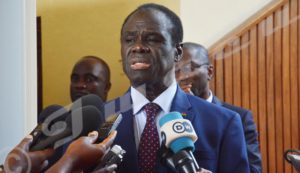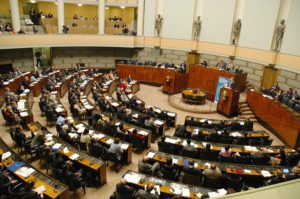The report that Kafando submitted to the UN Security Council caused a surprise. He salutes a new “dynamic”. Bujumbura government rejoices while the opposition is furious.

Kafando’s report on Burundi situation surprises the opposition
Long in the dock since the 2015 crisis, the Burundian government seems to have convinced the Special Envoy of the UN Secretary General. Indeed, it is a real plea in favor of Bujumbura that Mr. Kafando presented to the Security Council on Thursday, August 9, 2018.
The revision of the Constitution and the declaration of President Nkurunziza not to seek another term in 2020 are “the two major acts that offer an opportunity for advancement in the settlement of the Burundian situation. The UN Secretary-General’s envoy goes further speaking about a “new dynamic” that will help to create a new political environment.
Michel Kafando believes that the Kayanza’s road map disputed by the opposition is rather a consensual document which deserves encouragement. “This is an initiative the government should take in the context of the inter-Burundian dialogue to ensure the best possible participation of all stakeholders.”
What about the security question that has always been debated? As a reminder, Bujumbura government claims that peace and security are a reality. Its opponents paint a rather bleak picture of the situation. “Since the constitutional referendum, apart from the few objections of the opposition, the situation remains calm, said Michel Kafando.
Concerning the humanitarian crisis with its hundreds of thousands of refugees in exile, the UN Special Envoy praises the power in place, in collaboration with Tanzania and UNHCR, which has allowed the voluntary repatriation of some 35,000 Burundian refugees since September 2017. “These efforts must continue, “he said.
At the diplomatic level, the report of the emissary of Guterres praises again the power in place. “Several high-level delegations from some countries and international organizations have visited Burundi in recent times. Here, among others, Kafando mentions delegations from the African Parliamentary Union, the Association of African Ombudsmen and Mediators, the Forum of Parliamentarians of the International Conference on the Great Lakes Region and the Inter-Parliamentary Union of the International organization of Francophonie.
“The visits reflect Bujumbura government’s desire to improve relations with the international community,” he said.
An opposition member humorously said he had a feeling that he was listening to Albert Shingiro, Burundi representative at the UN, praising Bujumbura.
The UN envoy questions the sanctions taken by the European Union. “Financial restrictions are not always the best solution. He calls on Burundi and the European Union to resume their cooperation.
A complete turnaround
The question many observers ask themselves is why such a turnaround. As a reminder, on the eve of the revision of the Constitution, the Secretary General of the United Nations, Antonio Guterres, with the report of his emissary, had said an amendment to the Constitution would exacerbate tensions with the opposition. According to him, several proposed changes to the Constitution were called into question by the opposition “as attempts by the ruling party to tighten its grip, which can create unrest.”

The situation prevailing in Burundi on the table at the UN Security Council
The current report of Michel Kafando evokes the end of the Burundian crisis. According to him, the Security Council should invite the protagonists of the Burundian crisis to participate in the fifth round of talks in good faith “for a definitive settlement of the issue.”
This report presented to the Security Council would therefore signify a new approach, as if the UN envoy took note of the situation prevailing in Burundi.
At the Security Council, some voices like France and the United States rose to put a damper on the idyllic picture given by Mr. Kafando. They called on Burundi to improve the human rights situation, expand civic space, ensure freedom of the press and ensure good governance.
Interviewed, the former President of the Republic, Domitien Ndayizeye spoke of a circumstantial report. For him, with this report, Burundians are invited to know if they really have to wait for something from the international community without doing anything. For Domitien Ndayizeye, the absence of war is not proof of peace. “Seeing the absence of freedoms, the restriction of political space, embezzlement to name but a few, I think that the seeds of a crisis are still there.”
The National Independent Commission on Human Rights-CNIDH speaks of a realistic picture drawn by the emissary of the UN Secretary General.
According to Jean Baptiste Baribonekeza, president of CNIDH, the previous statements were manipulated and different organizations used them to justify measures against Burundi.
One thing is sure, the language of some members of the international community has changed. This would mean a kind of weariness, according to some analysts. A part of the international community thinks that Bujumbura has done its part with the announcement of President Nkurunziza not to run as president in the next elections.
Bujumbura could capitalize on this favorable analysis and take this opportunity to make decisions likely to advance the thaw.
As for the opposition or those who have been forced into exile, they must now deal with this new situation. They will have to find a strategy and other arguments to convince or … adapt to the constraints of time.
Written by Agnès Ndirubusa and translated by
Pierre Emmanuel Ngendakumana



















 IWACU Open Data
IWACU Open Data

